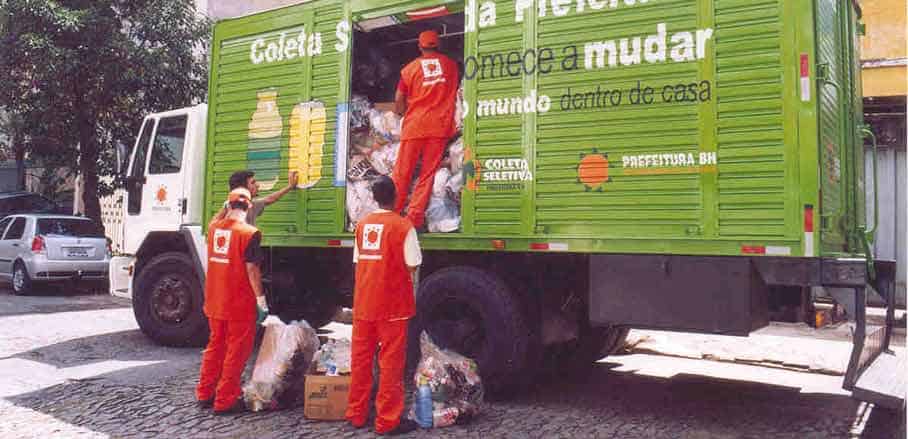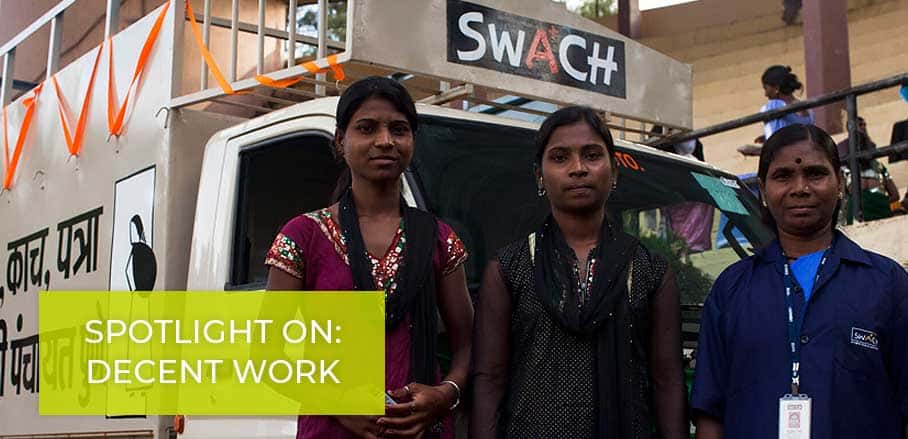Creating Decent Jobs Through Waste Pickers Cooperatives
By Sonia Dias
In precarious working environments, cooperatives hold an immense potential to increase social and economic inclusion of marginalized groups. Sonia Dias uses the examples of waste pickers cooperatives to illustrate how the concept of cooperatives helps implement the four pillars of the International Labor Organisation’s Decent Work Agenda—and calls on policy makers to create a favourable environment for this organisational form.
While the number of people working is growing, the number of jobs — especially decent jobs — is declining. In this new reality, [inlinetweet prefix=”” tweeter=”URBANET” suffix=””]waste picker cooperatives are proving essential in helping millions of marginalized workers gain income, social protection, and a stronger voice in policy forums[/inlinetweet] at local, national levels in many Latin American countries and at international levels, such as the International Labour Conference and the UN-Habitat urban conferences.
Over the last 30 years, I have engaged with waste pickers both in my home country, Brazil, and in many other parts of the world. I have seen men, women, and children work long hours under the hot sun and in torrential rains. Working in traffic or in open dumps under unsafe conditions, they face great risks earning their livelihoods. Despite the benefits they provide to cities and the environment, they too often go unrecognized and unsupported.
The Decent Work Agenda
Today’s workers are confronted with fewer jobs, less stable employment, and deteriorating working conditions. In this context, cooperatives play a vital role by furthering the four pillars of the International Labour Organisation’s Decent Work Agenda: the creation of jobs, the extension of social protection, the increase in social dialogue, the rights at work–to which I would like to also add gender equality, which deserves as much attention as the aforementioned four aspects.
Moving out of Informality
Cooperatives have been resourceful and innovative in tackling the social and economic exclusion of marginalized groups, reducing the level of vulnerability these groups experience. In many ways, as the ILO notes, cooperatives have helped “to advance the concept of moving out of informality because they are not only an effective mechanism to provide economic and social security for rural and urban informal economy actors, but because they have a record of transforming marginal activities into legally protected work”.
Cooperatives can increase earnings for poor workers. For example, SwaCH, a cooperative in Pune, India, established by the waste pickers’ union KKPKP, contracted for its workers to provide waste collection services to the municipality. By being allowed to charge households for the collection service, waste pickers in Pune managed to secure a steady monthly salary. This secured the livelihoods of thousands of waste pickers. Likewise, in Belo Horizonte, Brazil, the creation of waste pickers’ cooperatives in the 1990s helped establish a social accord whereby waste pickers were integrated as service providers into municipal source segregation schemes. Brazilian informal collectors of recyclables can gain formal status in a cooperative, which allows them to access funding available to solidarity economy enterprises.

Belo Horizonte city, Brazil, hires cooperatives for source segregation collection. © Sonia Dias files
Social Protection
Cooperatives can also extend social protection. In many waste pickers’ cooperatives in Brazil, workers have pooled resources to establish their own crèches, medical assistance, pension schemes, etc. These collaborative efforts mitigate the impacts of extreme poverty and the lack of inclusion in social security schemes.
Social Dialogue
Cooperatives (short: coops) can also amplify social dialogue. By pooling collective assets and strengthening cooperative members’ economic and political voice, workers expand their channels for social dialogue. This has been done in innovative ways through capacity building and knowledge sharing.
For example, the cooperatives funded by the Self-Employed Women’s Association (SEWA) in India have helped bring greater respect and recognition for workers as service providers and have opened paths for them to participate in policy dialogues with government agencies. In Brazil, waste pickers’ coops have formed a national movement representing coops across the country. Particularly, they address their demands to all levels of government. In the late 1980s, the National Waste and Citizenship Forum, a multi-stakeholder platform, gave waste pickers visibility and recognition in public forums. Together with universities and NGOs, they also created the Observatory for Inclusive Recycling to support the cooperative movement with research and capacity building to assist in social dialogue between different stakeholders in solid waste management.
Workers from diverse sectors of the informal economy deal with precarious and hazardous working conditions. Cooperatives can mitigate these problems by training workers on issues such as occupational health and safety and workers’ rights to avoid further exploitation.
Gender Equality
Cooperatives can also help further gender equality and build women’s economic empowerment by improving the working conditions of their informal jobs. [inlinetweet prefix=”” tweeter=”URBANET” suffix=””]Cooperatives fight for higher wages and improved working conditions, member-controlled operations and decision-making processes, and greater bargaining power to leverage improved wages and conditions[/inlinetweet]. In Brazil, female waste pickers have reported that working in a cooperative gives them more flexibility than other jobs—formal or informal. Recent gender training workshops with coop members in Brazil gave women a space to voice their issues in the workplace and in increasing their political participation, important steps towards attaining equality.

In Belo Horizonte, Brazil, WIEGO and partners focus on the empowerment of female waste pickers. © Ana Ogando
Creating a Favourable Environment for Cooperatives
Thus, cooperatives are in a unique position to promote decent work while also protecting livelihoods. [inlinetweet prefix=”” tweeter=”URBANET” suffix=””]Secure livelihoods are key to sustainable urban development[/inlinetweet]. And it is worth emphasizing that cooperatives are based on fundamental values such as liberty, equality, solidarity, democracy, mutual struggle and support. The focus on mutual help and equality of opportunity paves the way for the marginalized to enter economic niches as collective members. Coops foster sustainable and participatory businesses through their commitment to job security, improved working conditions, profit sharing and the support of members’ social needs. Overall, the principles on which cooperatives are founded are in line with the Sustainable Development Goals.
However, as highlighted in the ILO/WIEGO 2017 Cooperative Study, waste pickers’ cooperatives also face several challenges: limited economic and financial capacity; privatisation threats; lack of enforcement of waste management laws; and insufficient technical and political capacity.
On this International Workers Day, I call on governments and development agencies to support a policy and a regulatory environment that are favourable to cooperatives and to invest in building capacity. Only then can coops continue to fulfil their role in meeting the sustainable development agenda.
[inlinetweet prefix=”” tweeter=”URBANET” suffix=””]For data lovers, WUF9 offers plenty of deep dives.[/inlinetweet] Sessions will grapple with big data for cities (12 February), the current state of play for SDG indicators (11 February), an index for measuring global commitments made at Habitat III (9 February), citizen-sourced data (8 February), and high-tech tools like earth observatories (8 February).
